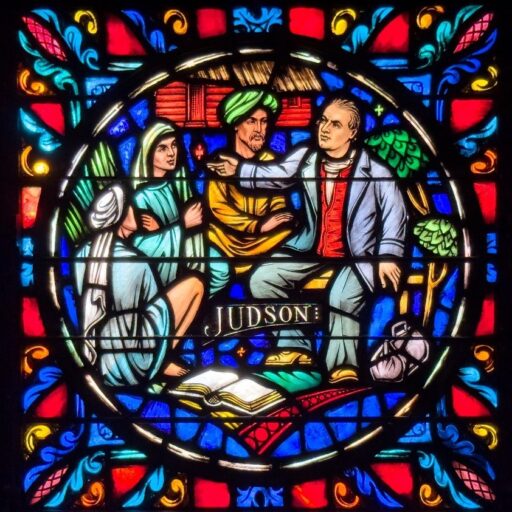1901-1976
National Hall of Fame for Great Americans
New York University, New York NY
At this point, let’s break our legacy system and spend some time with the National Hall of Fame for Great Americans that was originally built in 1901 as a part of New York University but stopped naming these great Americans in 1976. One hundred two persons are recognized in this colonnade and Adoniram Judson is not one of them. The National Hall of Fame was opened as “a window on early 20th century idea of greatness” or as the American Westminster Abbey.[1]

Nominees were received in 17 categories including “Missionaries and Explorers.” And in over 75 years of voting only one person in this category, Daniel Boone, made it into the National Hall of Fame for Great Americans. Adoniram Judson, Jr., was the only other person in this category who was nominated more than once but did not get the final tally.[2] That puts him in the same listing as Francis Scott Key, Martha Washington, George Caleb Bingham, Louisa May Alcott, William James, Amelia Earhart, Noah Webster, Henry Ford and Dorthea Dix. All were nominated more than once but never made it into the final Hall of Fame.
Adoniram Judson was nominated a second time in 1925 along with these other illuminaries: Dorothy Lyndedix, philanthropist; Samuel Adams, revolutionary statesman; Horace Bushnell, preacher; George Rogers Clark, soldier and explorer; John Singleton Copley, painter; William Lloyd Garrison, editor and reformer; John Jay, statesman and jurist; Adoniram Judson, missionary; William Penn: John Paul Jones: Nathaniel Greene, revolutionary general; Gen. Thomas Jonathan (Stonewall) Jackson of the Confederacy; Gen. Philip Henry Sheridan; Matthew Fontaine Maury, surveyor of sea routes; Benjam Thompson (Count Rumford;) Wendell Phillips, orator; Henry Hobson Richardson, architect; Benjamin Rush, physician; Noah Webster, lexicographer and author; Walt Whitman and Henry David Thoreau, authors; Charles Bulfinch, architect; Cyrus West Field, business man; Sydney Lanier, southern poet; Parul Revere; and James Otis, statesman.[3]
Adoniram Judson had an aversion toward fame and in a period of despondency after the death of Ann, rejected the honorary doctorate given to him by Brown University in 1823. He would rather sit with those who never achieved fame yet served their God and fellow humans with consistency and modesty.
+++++++++++++++
[1] https://en.wikipedia.org/wiki/Hall_of_Fame_for_Great_Americans
[2] “Hall of Fame List for University Told,” Los Angeles Times, June 13, 1925, p. 6
[3] Ibid..
